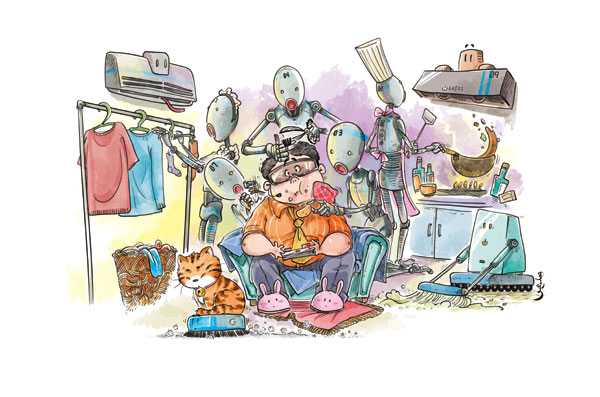 |
|
[Photo by Cai Meng/China Daily] |
When Li Mingming and Gong Meng, founders of SpaceH, decided to build a robot in Oct 2013, they wanted to do something to help their families.
The two young men were working in Shenzhen, thousands of kilometers away from their hometowns. Li wanted to keep up to date with his grandfather, who, in his 80s, was living in Nanchang, Jiangxi province.
"My grandfather is not well and we hire a nurse to look after him for eight hours a day. I am so far away from him and I want to keep updated about his latest situation, but he cannot even use the phone. So I want to build a robot that can tell me how he is and can let me see and talk to him when I want," Li, 30, says, "and the robot can also accompany him and keep an eye on him."
Gong also wanted his parents in Shandong province who suffer from chronic diseases, to have a companion at home, to supervise them to take medicines on time and to complete regular self-examinations.
In the 2014 animation film Big Hero 6, the white inflatable robot Baymax impressed audiences with its cute huggable look and ability to scan people's bodies to get their physical and psychological status and then give useful advice.
At the end of 2014, SpaceH built its first robot named Xiaohei, (little black), a play on Dabai (big white), Baymax's Chinese name.
Xiaohei can recognize its surroundings, and use sign language and follow simple oral orders, such as "come" and "go". Keeping its distance, it can follow the "nursing object" and bypass the objects in its way.
"The initial Xiaohei is designed for children, partly for entertainment and partly for remote nursing. The upgraded edition will be more suitable for elderly people and people with chronic diseases," Li says, "In addition to the robotic terminal, we will a build a cloud service platform for remote nursing and medical treatment."
With Chinese society getting older, more nursing services are needed, especially when many families have only children who leave their parents to live in major cities.
As the factory of the world, China has seen the development of its manufacturing reach a stage where development and wide use of automation technology is critical to future development.
Zhu Shiqiang, director of Robotics Research Center at Zhejiang University, says the market value of robots in China will reach 100 billion yuan in the future.
|
|
|
|
|
|
|
|
